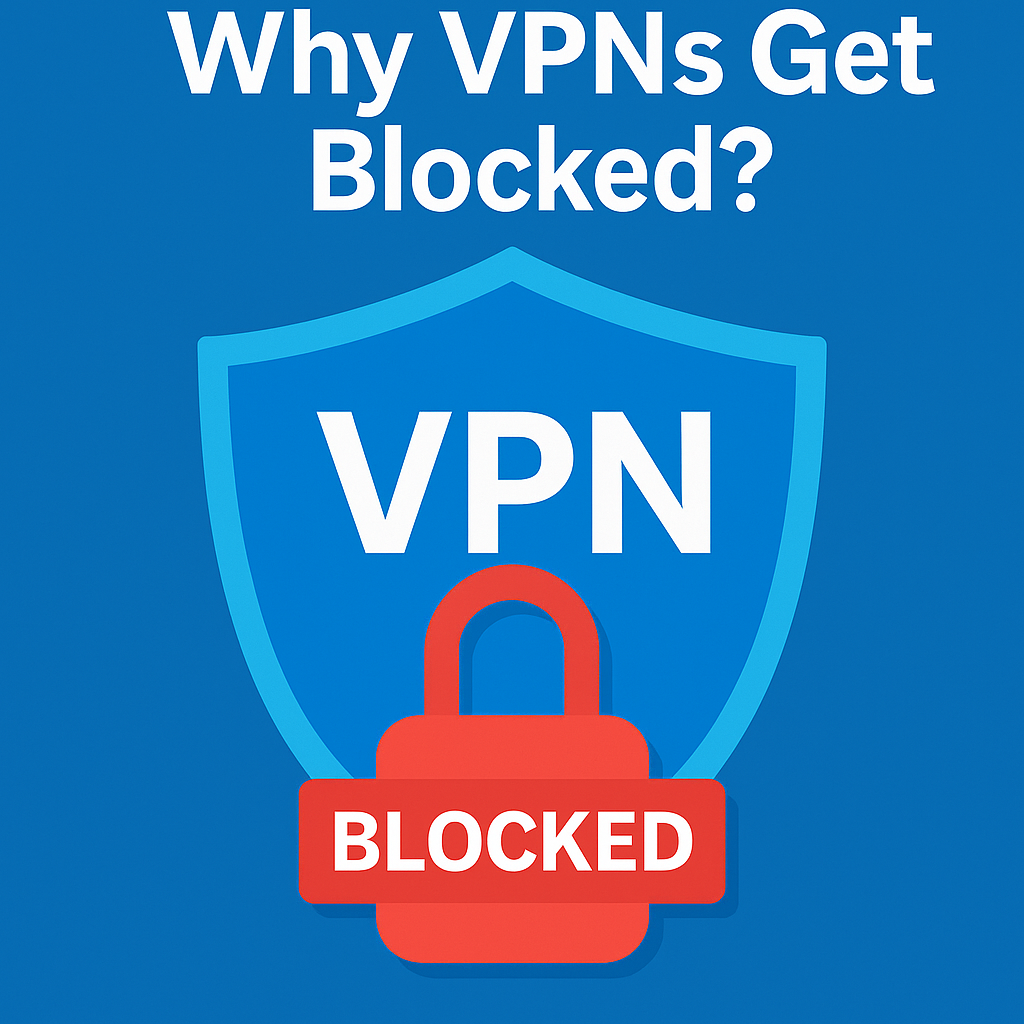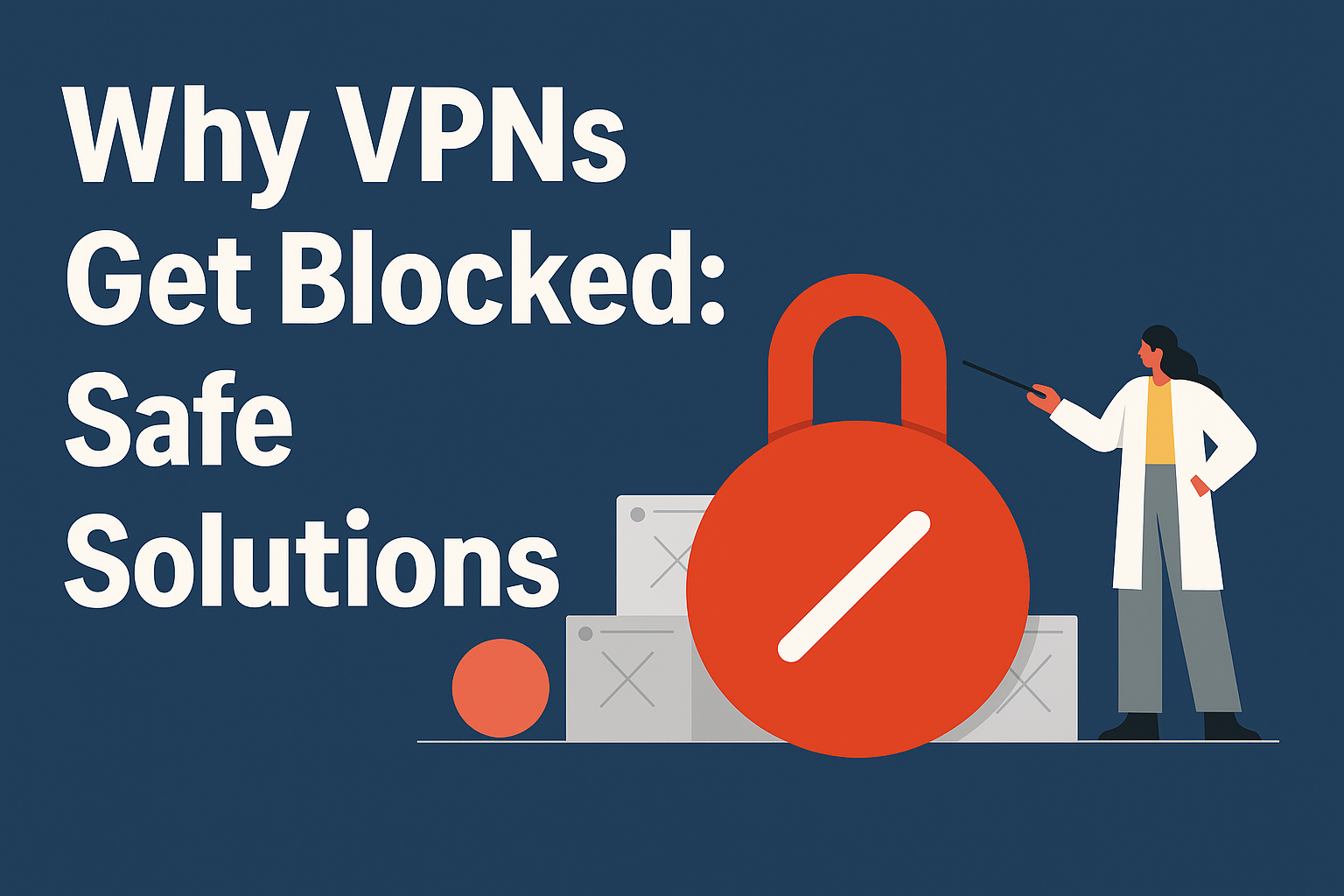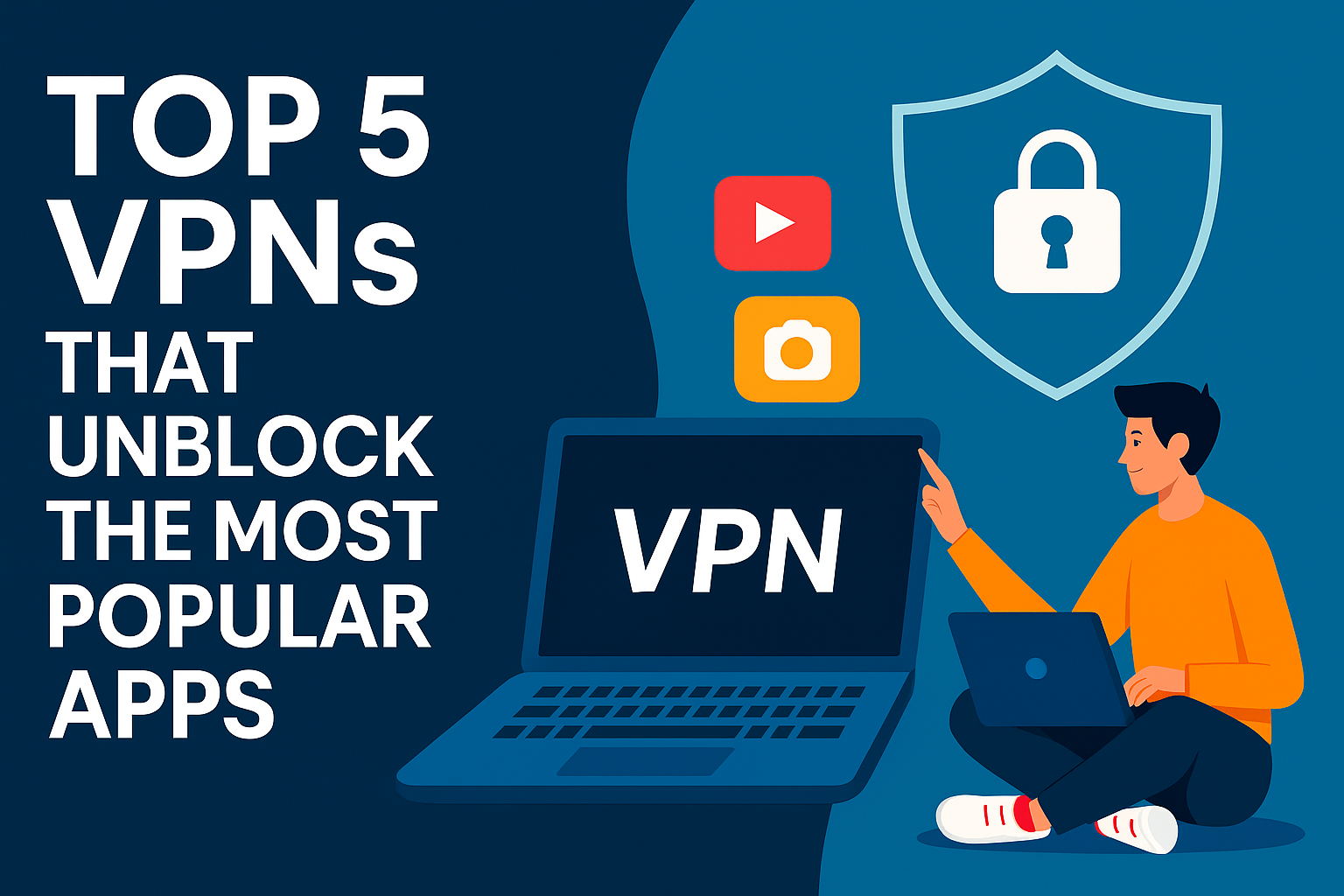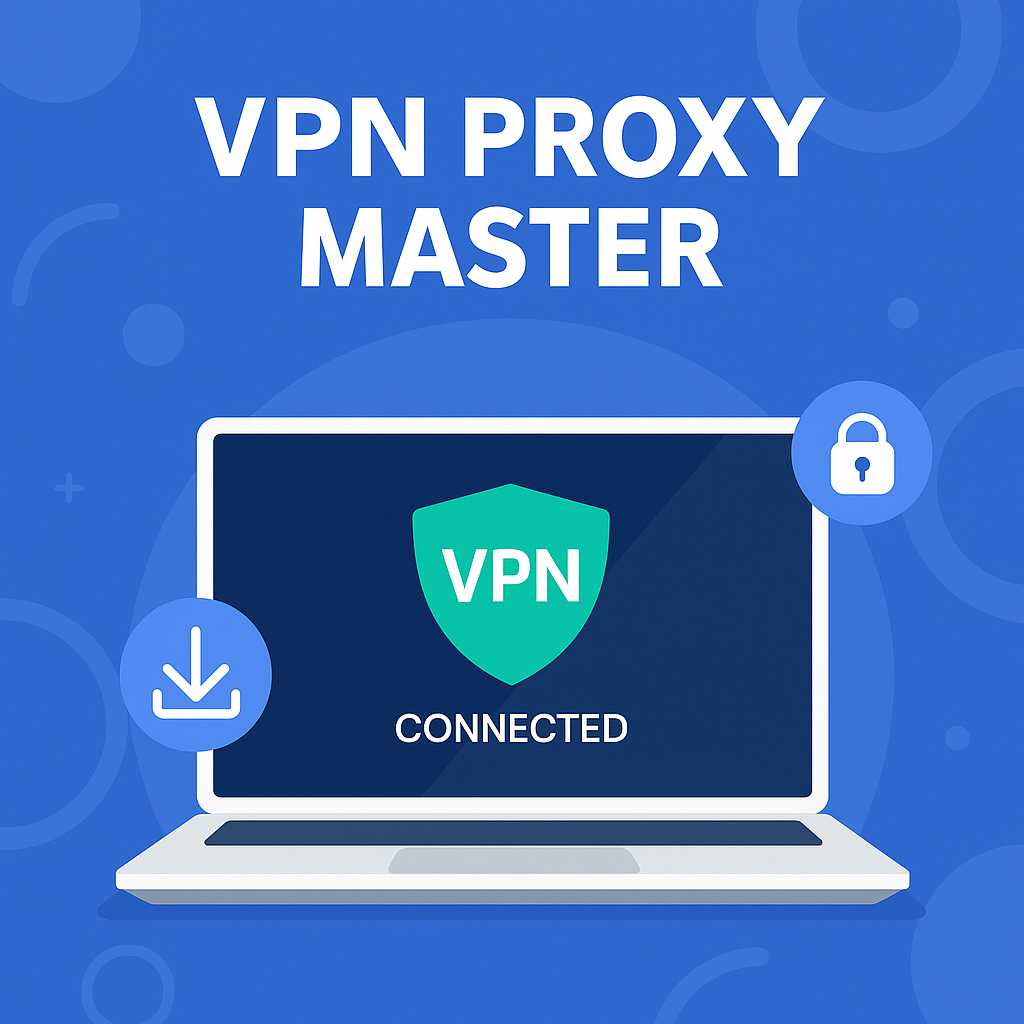
Introduction
Why VPNs get blocked: top reasons and safe solutions are becoming essential knowledge for anyone relying on a Virtual Private Network. In today’s connected world, VPNs are critical tools for protecting online privacy and security. Yet, many users are surprised when their VPN connections suddenly stop working on certain websites, apps, or networks.
In this comprehensive guide, we’ll explore why VPNs get blocked, what network administrators and service providers can and can’t see, and—most importantly—safe, legal solutions you can use to protect your privacy without breaking rules or violating policies.
Understanding why VPNs get blocked is critical for anyone relying on a VPN for privacy or security
🌐 Overview: Why Services Block VPNs
VPN technology encrypts your internet traffic, masks your IP address, and routes your data through secure servers. While this enhances privacy and bypasses some geographic restrictions, it can conflict with the goals of websites, apps, and network providers.
Many organizations block VPNs for reasons such as:
- Preventing fraud or abuse (e.g., ticket scalping, fake accounts).
- Enforcing licensing agreements for streaming services.
- Managing bandwidth or security in schools or workplaces.
Understanding these motives is the first step toward choosing safe solutions that respect both your privacy and legal requirements.
Section 2 – The Top Reasons VPNs Get Blocked
Understanding why VPNs get blocked will help you choose the safest, most effective—and legal—solutions. Here are the most common reasons:
🔒 1. Streaming Services Enforce Licensing Agreements
Streaming giants like Netflix, Hulu, or BBC iPlayer license content regionally. They must prevent users in one country from accessing shows licensed for another. To enforce agreements, these services analyze IP addresses and block those identified as VPN endpoints.
Example: If many users connect from the same server IP in another country, the streaming service flags and blocks that IP.
🏢 2. Workplaces Control Bandwidth and Productivity
Corporate networks often restrict VPNs to ensure employees follow IT policies and to prevent security risks. Some companies use firewalls or deep packet inspection (DPI) to detect VPN protocols.
Safe Solution: Speak with your IT department if you have legitimate reasons (e.g., remote work security). Many businesses offer approved VPN configurations for employees.
🏫 3. Schools Maintain Compliance and Protect Networks
Schools and universities frequently block VPNs to prevent students from bypassing content filters or using excessive bandwidth for streaming and gaming.
Safe Solution: If you need VPN access for research or privacy, request permission from network administrators or use the campus’s own approved VPN service.
🌐 4. Governments Enforce Local Regulations
In some countries, governments restrict VPNs to control access to information or enforce censorship laws. Blocking techniques include DNS filtering, IP blacklists, and DPI.
Legal Approach: Always research and follow local laws. If VPN use is restricted or requires government approval, consider contacting the provider for compliant servers or using locally permitted privacy tools.
🛡 5. Fraud Prevention on E-Commerce Platforms
E-commerce sites and payment processors sometimes block VPN connections to reduce fraud risk. VPN use can look suspicious to fraud-detection systems, especially for purchases from unusual locations.
Safe Solution: Temporarily disable your VPN or contact customer support to confirm legitimate activity rather than attempting to bypass fraud detection.
📶 6. Public WiFi Networks Manage Bandwidth
Airports, hotels, and cafés may block VPN traffic to conserve bandwidth or comply with usage policies. They often block specific ports or protocols (like OpenVPN).
Safe Solution: Politely ask the network provider if VPN use is allowed. If not, use secure HTTPS sites and two-factor authentication until you’re on a private connection.
🔍 7. Misconfigured or Blacklisted VPN Servers
Sometimes the problem isn’t intentional blocking—servers may be on public blacklists or misconfigured.
Safe Solution: Switch to a different server from your VPN provider or contact their support team. Reputable VPNs frequently rotate IPs to stay functional within legal bounds.
By understanding why VPNs get blocked, you can plan ahead and select safe solutions without risking policy violations.
Safe and Legal Solutions for Dealing with VPN Blocks
While VPN blocks can be frustrating, there are legitimate and ethical ways to address them. Instead of trying to sneak past firewalls or violate policies, these approaches help you stay compliant while protecting your privacy.
🛠 1. Contact Customer Support or Network Administrators
Many services and networks will approve VPN access if you have a legitimate reason—such as remote work security, research, or traveling.
Example: Explain to your company IT department that you’re connecting to sensitive files over hotel WiFi and need VPN protection. Most will whitelist your connection or provide an approved configuration.
Not all VPNs maintain healthy IP pools or comply with service policies. Top-tier providers frequently rotate IP addresses and maintain relationships with platforms to ensure legitimate usage.
👉Lear more on Which free vpn is safe to use
🔄 3. Switch to Another VPN Server (Within Policy)
Some providers offer servers optimized for streaming or business use. Rotating to a different server can restore access without breaking rules. Always choose a region where the service is licensed.
📧 4. Verify Your Account or Location
Streaming or payment services sometimes flag VPNs because of fraud risk. Verifying your account or providing legitimate location documents can restore access without violating agreements.
🧰 5. Use Official Tools or Partnerships
Some companies (for example, cloud-storage providers or universities) offer their own secure tunnels or recommended VPN services. Using these official options avoids policy conflicts.
🛡 6. Strengthen On-Device Security
Even without a VPN, you can still secure your data on restricted networks by:
- Using HTTPS websites only.
- Enabling two-factor authentication (2FA).
- Keeping your device’s operating system and security patches up-to-date.
These steps minimize risks until you’re on a network where VPN use is allowed.
🔗 7. Educate Yourself on Local Laws
In some regions, VPN restrictions are tied to government regulations. Always check local rules before traveling or connecting abroad. The Electronic Frontier Foundation provides reliable resources on global digital rights and safe, legal privacy tools.
📌 8. Plan Ahead for Travel
If you rely on VPN access during international trips, research which countries or networks allow VPN use and whether any services have approved server lists for those locations.
✨ Key Takeaway
Respecting service agreements and local laws not only keeps you within legal boundaries but also ensures long-term access to the tools and platforms you need.
According to the Electronic Frontier Foundation, responsible VPN usage protects privacy without violating policies.
The more you learn about why VPNs get blocked, the easier it becomes to follow legal guidelines.
🔒 Additional Privacy Best Practices and Risk Management
Even when VPN blocks occur, you can protect your privacy and keep your online activities safe. These best practices go beyond VPN use and help you manage risks responsibly:
🧩 1. Use Strong, Unique Passwords
Weak passwords remain one of the biggest online security gaps. Use a password manager to create and store unique credentials for every account. Even if your VPN connection is blocked, strong passwords help prevent breaches.
🔑 2. Enable Two-Factor Authentication (2FA)
2FA adds a critical layer of protection. Even if someone gains access to your login details over an unsecured network, they can’t log in without your secondary verification code.
🌐 3. Stick to HTTPS Websites
When VPN access is unavailable, HTTPS ensures your data is encrypted between your device and the website. Look for the lock icon in your browser’s address bar.
🛡 4. Avoid Sensitive Transactions on Public WiFi
Even with a VPN, public WiFi can be risky. If you encounter blocks, wait until you’re on a secure network before performing tasks like online banking or sending sensitive documents.
📱 5. Keep Your Devices Updated
Outdated operating systems or apps can have vulnerabilities. Regular updates patch these issues and keep you safer, even without VPN protection.
🖥 6. Use Firewalls and Antivirus Software
A good firewall and antivirus program help detect malicious activity. They’re essential safeguards when you’re on a network where your VPN is blocke

🧠 8. Educate Yourself on Privacy Regulations
Digital privacy laws change often. Staying informed about current policies in your country or the one you’re visiting ensures you remain compliant and secure
Understanding why VPNs get blocked is essential for avoiding service interruptions.
Frequently Asked Questions
1. Why are VPNs blocked by some services or networks?
VPNs are often blocked to enforce licensing agreements (e.g., for streaming), prevent fraud on e-commerce platforms, manage bandwidth on public WiFi, or maintain security in workplaces and schools. Blocking doesn’t necessarily mean VPNs are unsafe—it’s about the service’s policies.
2. Is it illegal to use a VPN where they’re blocked?
In most countries, VPN use itself is legal. However, bypassing restrictions or violating a site’s terms of service can lead to account suspensions or legal consequences. Always check local laws and platform rules before using a VPN on a restricted network.
3. How can I legally restore VPN access if it’s blocked?
Contact the service or network administrator and explain your legitimate need (e.g., remote work security or privacy on public WiFi). You can also switch to a reputable VPN provider with approved servers or use an official tunneling service recommended by your company or school.
4. Will switching VPN servers always fix blocks?
Not always. Some services maintain extensive blacklists of VPN IPs. Switching servers can help if the block is IP-based, but it won’t bypass deep policy restrictions or licensing requirements. Using a provider with healthy server pools and regular IP rotations increases your chances of regaining access.
5. Can public WiFi networks see what I do if my VPN is blocked?
If your VPN is blocked and you connect without it, the WiFi network can see unencrypted traffic, visited domains, and connection times. To stay safe, use HTTPS websites, enable 2FA, and avoid logging into sensitive accounts on untrusted networks.
6. Are free VPNs more likely to be blocked?
Yes. Free VPNs often use fewer servers and older protocols, making them easier to detect and block. Paid, reputable providers invest in rotating IPs and maintaining compatibility with services, which reduces the likelihood of being blocked.
Use secure HTTPS sites, strong passwords, and 2FA. Avoid sensitive transactions on public WiFi. When possible, use official or approved VPN tools offered by your employer, school, or a trusted provider that complies with local laws.
For anyone worried about privacy, knowing why VPNs get blocked can prevent unnecessary disruptions
🏁 Conclusion
Why VPNs get blocked: top reasons and safe solutions is a topic every privacy-conscious internet user should understand. Services and networks may block VPNs for many reasons—ranging from licensing enforcement and fraud prevention to bandwidth management and security.
When you learn why VPNs get blocked, you can choose safer, approved alternatives.
The key takeaway is that while blocks can be inconvenient, there are legal, policy-compliant actions you can take:
- Contact network administrators or service support.
- Use reputable VPN providers with strong IP management.
- Follow local regulations and platform terms of service.
- Strengthen your device security with HTTPS, 2FA, and regular updates.
Staying informed and respecting rules ensures you keep your data private without risking account bans or policy violations. By applying these safe solutions, you can maintain online privacy and security responsibly.
✅ External Resource
For more on digital rights and privacy, visit the Electronic Frontier Foundation.
👉 For travelers, see our guide on the Best VPN for Travel in 2025 for secure browsing tips


